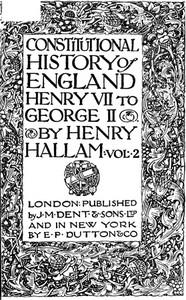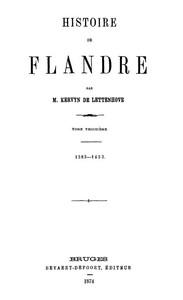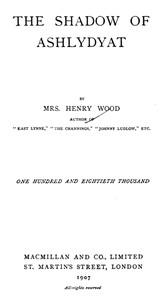|
|
Read this ebook for free! No credit card needed, absolutely nothing to pay.Words: 136456 in 20 pages
This is an ebook sharing website. You can read the uploaded ebooks for free here. No credit cards needed, nothing to pay. If you want to own a digital copy of the ebook, or want to read offline with your favorite ebook-reader, then you can choose to buy and download the ebook.

: Constitutional History of England Henry VII to George II. Volume 2 of 3 by Hallam Henry - Constitutional history Great Britain@FreeBooksWed 07 Jun, 2023 ainst Glamorgan's presumption in concluding such a treaty, and committed him to prison on a charge of treason. He produced two commissions from the king, secretly granted without any seal or the knowledge of any minister, containing the fullest powers to treat with the Irish, and promising to fulfil any conditions into which he should enter. The king, informed of this, disavowed Glamorgan; and asserted in a letter to the parliament that he had merely a commission to raise men for his service, but no power to treat of anything else, without the privity of the lord lieutenant, much less to capitulate anything concerning religion or any property belonging either to church or laity. Glamorgan however was soon released, and lost no portion of the king's or his family's favour. This transaction has been the subject of much historical controversy. The enemies of Charles, both in his own and later ages, have considered it as a proof of his indifference at least to the protestant religion, and of his readiness to accept the assistance of Irish rebels on any conditions. His advocates for a long time denied the authenticity of Glamorgan's commissions. But Dr. Birch demonstrated that they were genuine; and, if his dissertation could have left any doubt, later evidence might be adduced in confirmation. Hume, in a very artful and very unfair statement, admitting the authenticity of these instruments, endeavours to show that they were never intended to give Glamorgan any power to treat without Ormond's approbation. But they are worded in the most unconditional manner, without any reference to Ormond. No common reader can think them consistent with the king's story. I do not, however, impute to him any intention of ratifying the terms of Glamorgan's treaty. His want of faith was not to the protestant, but to the catholic. Upon weighing the whole of the evidence, it appears to me that he purposely gave Glamorgan, a sanguine and injudicious man, whom he could easily disown, so ample a commission as might remove the distrust that the Irish were likely to entertain of a negotiation wherein Ormond should be concerned; while by a certain latitude in the style of the instrument, and by his own letters to the lord lieutenant about Glamorgan's errand, he left it open to assert, in case of necessity, that it was never intended to exclude the former's privity and sanction. Charles had unhappily long been in the habit of perverting his natural acuteness to the mean subterfuges of equivocal language. This party was still so far predominant, having the strong support of the city of London and its corporation, with almost all the peers who remained in their house, that the independents and other sectaries neither opposed this ordinance for its temporary establishment, nor sought anything farther than a toleration for their own worship. The question, as Neal well observes, was not between presbytery and independency, but between presbytery with a toleration, and without one. Not merely from their own exclusive bigotry, but from a political alarm by no means ungrounded, the presbyterians stood firmly against all liberty of conscience. But in this again they could not influence the House of Commons to suppress the sectaries, though no open declaration in favour of indulgence was as yet made. It is still the boast of the independents that they first brought forward the great principles of religious toleration which had been confined to a few philosophical minds; to Sir Thomas More, in those days of his better judgment when he planned his republic of Utopia, to Thuanus, or L'Hospital. Such principles are indeed naturally congenial to the persecuted; and it is by the alternate oppression of so many different sects, that they have now obtained their universal reception. But the independents also assert that they first maintained them while in power; a far higher praise, which however can only be allowed them by comparison. Without invidiously glancing at their early conduct in New England, it must be admitted that the continuance of the penal laws against catholics, the prohibition of the episcopalian worship, and the punishment of one or two anti-trinitarians under Cromwell, are proofs that the tolerant principle had not yet acquired perfect vigour. If the independent sectaries were its earliest advocates, it was the Anglican writers, the latitudinarian school of Chillingworth, Hales, Taylor, Locke, and Hoadley, that rendered it victorious. The king, as I have said, and his party cherished too sanguine hopes from the disunion of their opponents. Though warned of it by the parliamentary commissioners at Uxbridge, though in fact it was quite notorious and undisguised, they seem never to have comprehended that many active spirits looked to the entire subversion of the monarchy. The king in particular was haunted by a prejudice, natural to his obstinate and undiscerning mind, that he was necessary to the settlement of the nation; so that, if he remained firm, the whole parliament and army must be at his feet. Yet during the negotiations at Newcastle there was daily an imminent danger that the majority of parliament, irritated by his delays, would come to some vote excluding him from the throne. The Scots presbyterians, whatever we may think of their behaviour, were sincerely attached, if not by loyal affection, yet by national pride, to the blood of their ancient kings. They thought and spoke of Charles as of a headstrong child, to be restrained and chastised, but never cast off. But in England he had absolutely no friends among the prevailing party; many there were who thought monarchy best for the nation, but none who cared for the king. This schism nevertheless between the parliament and the army was at least in appearance very desirable for Charles, and seemed to afford him an opportunity which a discreet prince might improve to great advantage, though it unfortunately deluded him with chimerical expectations. At the conclusion of the war, which the useless obstinacy of the royalists had protracted till the beginning of 1647, the Commons began to take measures for breaking the force of their remaining enemy. They resolved to disband a part of the army, and to send the rest into Ireland. They formed schemes for getting rid of Cromwell, and even made some demur about continuing Fairfax in command. But in all measures that exact promptitude and energy, treachery and timidity are apt to enfeeble the resolutions of a popular assembly. Their demonstrations of enmity were however so alarming to the army, who knew themselves disliked by the people, and dependent for their pay on the parliament, that as early as April, 1647, an overture was secretly made to the king, that they would replace him in his power and dignity. He cautiously answered, that he would not involve the kingdom in a fresh war, but should ever feel the strongest sense of this offer from the army. Whether they were discontented at the coldness of this reply, or, as is more probable, the offer had only proceeded from a minority of the officers, no further overture was made, till not long afterwards the bold manoeuvre of Joyce had placed the king's person in their power. Those who have once bowed their knee to force, must expect that force will be for ever their master. In a few weeks after this submission of the Commons to the army, they were insulted by an unruly, tumultuous mob of apprentices, engaged in the presbyterian politics of the city, who compelled them by actual violence to rescind several of their late votes. Trampled upon by either side, the two speakers, several peers, and a great number of the lower house, deemed it somewhat less ignominious, and certainly more politic, to throw themselves on the protection of the army. They were accordingly soon restored to their places, at the price of a more complete and irretrievable subjection to the military power than they had already undergone. Though the presbyterians maintained a pertinacious resistance within the walls of the house, it was evident that the real power of command was gone from them, and that Cromwell with the army must either become arbiters between the king and parliament, or crush the remaining authority of both. It is, however, probable, from the king's extreme tenaciousness of his prerogative, that these were the conditions that he found it most difficult to endure. Having obtained, through Sir John Berkley, a sight of the propositions before they were openly made, he expressed much displeasure; and said that, if the army were inclined to close with him, they would never have demanded such hard terms. He seems to have principally objected, at least in words, to the exception of seven unnamed persons from pardon, to the exclusion of his party from the next parliament, and to the want of any articles in favour of the church. Berkley endeavoured to show him that it was not likely that the army, if meaning sincerely, should ask less than this. But the king, still tampering with the Scots, and keeping his eyes fixed on the city and parliament, at that moment came to an open breach with the army, disdainfully refused the propositions when publicly tendered to him, with such expressions of misplaced resentment and preposterous confidence as convinced the officers that they could neither conciliate nor trust him. This unexpected haughtiness lost him all chance with those proud and republican spirits; and, as they succeeded about the same time in bridling the presbyterian party in parliament, there seemed no necessity for an agreement with the king, and their former determinations of altering the frame of government returned with more revengeful fury against his person. Yet in the midst of this peril and seeming abandonment, his affairs were really less desperate than they had been; and a few rays of light broke for a time through the clouds that enveloped him. From the hour that the Scots delivered him up at Newcastle, they seem to have felt the discredit of such an action, and longed for the opportunity of redeeming their public name. They perceived more and more that a well-disciplined army, under a subtle chief inveterately hostile to them, were rapidly becoming masters of England. Instead of that covenanted alliance, that unity in church and state they had expected, they were to look for all the jealousy and dissension that a complete discordance in civil and spiritual polity could inspire. Their commissioners, therefore, in England, Lanerk, always a moderate royalist, and Lauderdale, a warm presbyterian, had kept up a secret intercourse with the king at Hampton Court. After his detention at Carisbrook, they openly declared themselves against the four bills proposed by the English parliament; and at length concluded a private treaty with him, by which, on certain terms quite as favourable as he could justly expect, they bound themselves to enter England with an army, in order to restore him to his freedom and dignity. This invasion was to be combined with risings in various parts of the country; the presbyterian and royalist, though still retaining much of animosity towards each other, concurring at least in abhorrence of military usurpation; and the common people having very generally returned to that affectionate respect for the king's person, which sympathy for his sufferings, and a sense how little they had been gainers by the change of government, must naturally have excited. There can be no more erroneous opinion than that of such as believe that the desire of overturning the monarchy produced the civil war, rather than that the civil war brought on the former. In a peaceful and ancient kingdom like England, the thought of change could not spontaneously arise. A very few speculative men, by the study of antiquity, or by observation of the prosperity of Venice and Holland, might be led to an abstract preference of republican politics; some fanatics might aspire to a Jewish theocracy; but at the meeting of the Long Parliament, we have not the slightest cause to suppose that any party, or any number of persons among its members, had formed what must then have appeared so extravagant a conception. The insuperable distrust of the king's designs, the irritation excited by the sufferings of the war, the impracticability, which every attempt at negotiation displayed, of obtaining his acquiescence to terms deemed indispensable, gradually created a powerful faction, whose chief bond of union was a determination to set him aside. What further scheme they had planned is uncertain; none probably in which any number were agreed: some looked to the Prince of Wales, others perhaps, at one time, to the elector palatine; but necessity itself must have suggested to many the idea of a republican settlement. In the new-modelled army of 1645, composed of independents and enthusiasts of every denomination, a fervid eagerness for changes in the civil polity, as well as in religion, was soon found to predominate. Not checked, like the two houses, by attachment to forms, and by the influence of lawyers, they launched forth into varied projects of reform, sometimes judicious, or at least plausible, sometimes wildly fanatical. They reckoned the king a tyrant whom, as they might fight against, they might also put to death, and whom it were folly to provoke, if he were again to become their master. Elated with their victories, they began already in imagination to carve out the kingdom for themselves; and remembered that saying so congenial to a revolutionary army, that the first of monarchs was a successful leader, the first of nobles were his followers. We are not certainly to conclude that all who, in 1648, had made up their minds against the king's restoration, were equally averse to all regal government. The Prince of Wales had taken so active, and, for a moment, so successful a share in the war of that year, that his father's enemies were become his own. Meetings however were held, where the military and parliamentary chiefs discussed the schemes of raising the Duke of York, or his younger brother the Duke of Glocester, to the throne. Cromwell especially wavered, or pretended to waver, as to the settlement of the nation; nor is there any evidence, so far as I know, that he had ever professed himself adverse to monarchy, till, dexterously mounting on the wave which he could not stem, he led on those zealots who had resolved to celebrate the inauguration of their new commonwealth with the blood of a victim king. A very small number among those who sat in this strange tribunal upon Charles the First were undoubtedly capable of taking statesman-like views of the interests of their party, and might consider his death a politic expedient for consolidating the new settlement. It seemed to involve the army, which had openly abetted the act, and even the nation by its passive consent, in such inexpiable guilt towards the royal family, that neither common prudence nor a sense of shame would permit them to suffer its restoration. But by far the greater part of the regicides such considerations were either overlooked or kept in the background. Their more powerful motive was that fierce fanatical hatred of the king, the natural fruit of long civil dissension, inflamed by preachers more dark and sanguinary than those they addressed, and by a perverted study of the Jewish scriptures. They had been wrought to believe, not that his execution would be justified by state-necessity or any such feeble grounds of human reasoning, but that it was a bounden duty, which with a safe conscience they could not neglect. Such was the persuasion of Ludlow and Hutchinson, the most respectable names among the regicides; both of them free from all suspicion of interestedness or hypocrisy, and less intoxicated than the rest by fanaticism. "I was fully persuaded," says the former, "that an accommodation with the king was unsafe to the people of England, and unjust and wicked in the nature of it. The former, besides that it was obvious to all men, the king himself had proved, by the duplicity of his dealing with the parliament, which manifestly appeared in his own papers, taken at the battle of Naseby and elsewhere. Of the latter I was convinced by the express words of God's law; 'that blood defileth the land, and the land cannot be cleansed of the blood that is shed therein, but by the blood of him that shed it.' And therefore I could not consent to leave the guilt of so much blood on the nation, and thereby to draw down the just vengeance of God upon us all, when it was most evident that the war had been occasioned by the invasion of our rights and open breach of our laws and constitution on the king's part." "As for Mr. Hutchinson," says his high-souled consort, "although he was very much confirmed in his judgment concerning the cause, yet being here called to an extraordinary action, whereof many were of several minds, he addressed himself to God by prayer, desiring the Lord, that, if through any human frailty, he were led into any error or false opinion in those great transactions, he would open his eyes, and not suffer him to proceed, but that he would confirm his spirit in the truth, and lead him by a right-enlightened conscience; and finding no check, but a confirmation in his conscience, that it was his duty to act as he did, he, upon serious debate, both privately and in his addresses to God, and in conferences with conscientious, upright, unbiassed persons, proceeded to sign the sentence against the king. Although he did not then believe but it might one day come to be again disputed among men, yet both he and others thought they could not refuse it without giving up the people of God, whom they had led forth and engaged themselves unto by the oath of God, into the hands of God's and their enemies; and therefore he cast himself upon God's protection, acting according to the dictates of a conscience which he had sought the Lord to guide; and accordingly the Lord did signalise his favour afterward to him." But, whether we may think this war to have originated in the king's or the parliament's aggression, it is still evident that the former had a fair case with the nation, a cause which it was no plain violation of justice to defend. He was supported by the greater part of the Peers, by full one-third of the Commons, by the principal body of the gentry, and a large proportion of other classes. If his adherents did not form, as I think they did not, the majority of the people, they were at least more numerous, beyond comparison, than those who demanded or approved of his death. The steady deliberate perseverance of so considerable a body in any cause takes away the right of punishment from the conquerors, beyond what their own safety or reasonable indemnification may require. The vanquished are to be judged by the rules of national, not of municipal, law. Hence, if Charles, after having by a course of victories or the defection of the people prostrated all opposition, had abused his triumph by the execution of Essex or Hampden, Fairfax or Cromwell, I think that later ages would have disapproved of their deaths as positively, though not quite as vehemently, as they have of his own. The line is not easily drawn, in abstract reasoning, between the treason which is justly punished, and the social schism which is beyond the proper boundaries of law; but the civil war of England seems plainly to fall within the latter description. These objections strike me as unanswerable, even if the trial of Charles had been sanctioned by the voice of the nation through its legitimate representatives, or at least such a fair and full convention as might, in great necessity, supply the place of lawful authority. But it was, as we all know, the act of a bold but very small minority, who having forcibly expelled their colleagues from parliament, had usurped, under the protection of a military force, that power which all England reckoned illegal. I cannot perceive what there was in the imagined solemnity of this proceeding, in that insolent mockery of the forms of justice, accompanied by all unfairness and inhumanity in its circumstances, which can alleviate the guilt of the transaction; and if it be alleged that many of the regicides were firmly persuaded in their consciences of the right and duty of condemning the king, we may surely remember that private murderers have often had the same apology. Free books android app tbrJar TBR JAR Read Free books online gutenberg More posts by @FreeBooks
: Leonarda: Näytelmä neljässä tapauksessa by Bj Rnson Bj Rnstjerne Enlund J Translator - Bjørnson Bjørnstjerne 1832-1910 Translations into Finnish; Norwegian drama Translations into Finnish@FreeBooksWed 07 Jun, 2023

: Histoire de Flandre (T. 3/4) by Kervyn De Lettenhove Joseph Marie Bruno Constantin Baron - Flanders (Belgium) History FR Histoire@FreeBooksWed 07 Jun, 2023
|
Terms of Use Stock Market News! © gutenberg.org.in2025 All Rights reserved.






